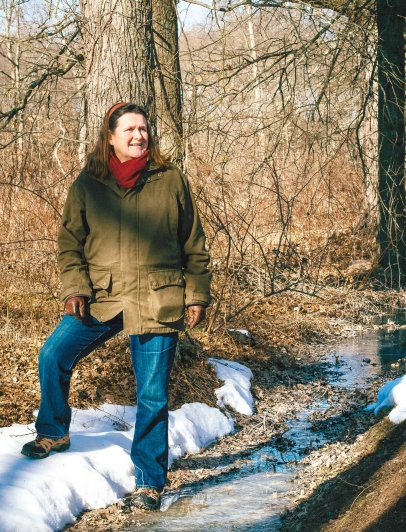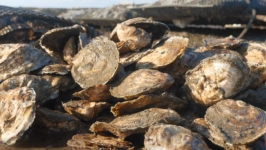Water Questions for the New Jersey Highlands Coalition
A conversation with Julia Somers, executive director of the New Jersey Highlands Coalition
With a severe drought gripping California and many predicting that water shortages will become the new normal on the West Coast, some experts believe a significant amount of agricultural production will shift back to the American Northeast in years to come. In addition to fertile soils and a moderate climate, an abundant supply of fresh water makes the Garden State an ideal place to grow vegetables.
But worth noting: California once thought it had plenty of water too.
Today, the majority of New Jerseyans—5.4 million— get their clean drinking water from the New Jersey Highlands, whose water supply received significant protection from the 2004 Highlands Act. More of the state’s fresh water—17 trillion gallons—received protection from the 1979 Pinelands Protection Act. But despite these important pieces of legislation, New Jersey’s leading environmental organizations caution that better planning is needed to ensure that fresh water remains a plentiful resource in the state’s future.
It seems certain that more New Jerseyans will need fresh water in years to come. According to the US Census Bureau, the state’s population will increase by nearly 1 million people by 2020, placing additional demand on the state’s water resources, particularly in areas that have not experienced high water demand before.
To learn more about water in New Jersey, Edible Jersey recently interviewed Julia Somers, executive director of the New Jersey Highlands Coalition, one of the leading advocates for clean water in the New Jersey Highlands region and throughout the state.
Q: It’s been my impression that New Jersey is a state with abundant water resources. Is that correct?
Yes and no. New Jersey is blessed with abundant rainfall and wonderful natural systems in the Highlands and the Pinelands to collect, protect and naturally clean the water supply that New Jersey depends on.
That sounds great, yet we have so abused our natural systems that the US Geological Survey has shown that we actually have a shortage of groundwater in more than half of the Highlands. Some of these groundwater deficits are small, and we believe can be mitigated by changes in human activity—for instance, please don’t water your lawn so much!—but some are severe, with the worst running a deficit of over 6 million gallons per day. That one is in an area that has experienced overbuilding, way beyond the capacity of the natural systems to keep up with. The town has to do what towns outside the Highlands have to do—spend a lot of money buying clean water from elsewhere.
Q: Is there anything New Jersey should be learning from the drought situation in California?
Absolutely. California had no plan to ensure they didn’t outpace their water supply by paving it over or consuming too much, and now finds itself with a huge problem. In New Jersey, the Highlands Act and the Pinelands Act provide the planning, guidance and the early warning system to prevent us from finding ourselves in the same situation. Our legislature has been proactive and wise, and serves as a great example for others. That said, efforts to weaken the Highlands Act—which are very real as we speak—would catapult us back into the bad old days of the Wild West of development with no concern for our water supply future.
Q: Several New Jersey environmental organizations, including the Highlands Coalition, have been advocating for the release of a Water Supply Master Plan from the state. What is this plan, and why is it important?
New Jersey hasn’t officially updated its Water Supply Master Plan since 1996. This plan, when kept up to date, should inform all planning decisions statewide to make sure we have enough water today, and to support development and human needs in the future. Legislation requires that we regularly update the plan, but successive administrations of every stripe have not done so. Why? We believe it’s because we will learn that we have some serious problems with serious consequences for future development and redevelopment. There are folks who don’t want to hear that there isn’t enough water capacity—that we already have water shortages—meaning we cannot allow approval of some projects. Ignorance is bliss, apparently! But it’s also irresponsible. If we don’t know what today’s water capacity situation is, we cannot make decisions about future water supply needs, and we do nothing. Business continues as usual.
Q: New Jersey is somewhat infamous for pollution. Is our water polluted?
Every state has to regularly report to the federal government on the status of its waters. Through those reports, we know that there is only one small stream in the state (in far northwestern Sussex County) that we can truly say is not polluted. The federal Clean Water Act requires us to try and address this situation, and the federal Department of Environmental Protection expects the New Jersey Department of Environmental Protection to work to improve the situation. Sad to say, we don’t think this administration is doing a good job, and in fact is actually trying to weaken the most important protective regulations we have.
Q: One of your organization’s petitions states that “water supplies in parts of Cape May and Cumberland Counties are contaminated with salt water.” How did that happen?
When you pull water out of the ground at a faster rate than it can be replenished, it’s a little like sucking on a sponge. These are counties close to the sea. Nature abhors a vacuum, and salt water is drawn in from nearby brackish and ocean water to replace the water that had been there.
Q: Is there anything you believe our farmers should be doing differently to safeguard our water?
Farmers have no intention of creating a health problem for anyone. Among other things, it’s not a good business model! However, lately we have all become more aware of the importance of reducing nitrates in our water supply, and many farmers today are reducing their use of fertilizer (which is expensive to apply) or even going organic. Also, they are regulated now in how they handle larger quantities of farm animal waste, to make sure that doesn’t contaminate groundwater or local streams.
Q: What’s your opinion on bottled water?
To be blunt, it’s a colossal waste of money and we are putting it in gazillions of plastic bottles that are themselves becoming an environmental hazard in our waste stream. The United States has some of the most protective rules and regulations to protect the quality of our drinking water. People should feel confident that what comes out of the tap in New Jersey is safe, or at least as safe as bottled water, so there is no need for them to buy it.
Q: If you could recommend one habit change to the average
New Jersey citizen, around water use, what would it be? Don’t let the tap run while you are brushing your teeth!
Julia Somers has been executive director of the New Jersey Highlands Coalition since 2006. Its mission is to protect, restore and enhance the water and other natural and cultural resources of the New Jersey Highlands for the benefit of all citizens and businesses in the state of New Jersey.






